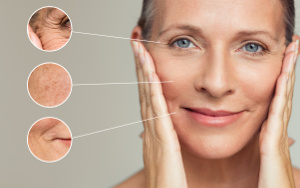Q10’s role in skin health and as a natural anti-aging agent
 Our bodies naturally produce Q10, a compound with a crucial role in cellular energy metabolism that also functions as an antioxidant and protects against cell damage. Our natural production of Q10 declines significantly with age and as a result of various stress factors, thereby accelerating signs of aging. This also affects the condition of the skin. Research suggests that skincare products containing Q10 may slow down visible signs of aging, such as wrinkles and sagging skin. This is supported by a review article published in The Journal of Clinical Aesthetic Dermatology. Additionally, previous studies indicate that high-quality Q10 supplements may have potential benefits in counteracting various aging processes and the development of chronic diseases.
Our bodies naturally produce Q10, a compound with a crucial role in cellular energy metabolism that also functions as an antioxidant and protects against cell damage. Our natural production of Q10 declines significantly with age and as a result of various stress factors, thereby accelerating signs of aging. This also affects the condition of the skin. Research suggests that skincare products containing Q10 may slow down visible signs of aging, such as wrinkles and sagging skin. This is supported by a review article published in The Journal of Clinical Aesthetic Dermatology. Additionally, previous studies indicate that high-quality Q10 supplements may have potential benefits in counteracting various aging processes and the development of chronic diseases.
Many people strive to maintain a youthful appearance, and the market is flooded with heavily promoted anti-wrinkle creams, while treatments like fillers, Botox, and plastic surgery are becoming increasingly common—sometimes with undesirable results. However, there are also more natural solutions without side effects that target the underlying causes of skin aging. These causes can be both internal and external, contributing to the skin’s loss of firmness and the formation of wrinkles.
It is well known that UVB radiation from the sun accelerates skin aging. However, a large meta-analysis suggests that people who get more sun exposure generally maintain a healthier appearance and live longer. The key is to avoid sunburns rather than completely avoiding the sun.
Smoking is another well-documented factor that accelerates skin aging, mainly because cigarette smoke generates cascades of free radicals in the bloodstream. Free radicals are aggressive molecules that can attack and damage cells throughout the body, including skin cells. The impact of free radicals is further exacerbated by stress, medications, and toxins. Oxidative stress—when there is an imbalance between free radicals and antioxidants—can be particularly damaging.
Skin aging also has internal causes, primarily due to dysfunctions in the mitochondria, the energy-producing powerhouses of our cells. Mitochondrial dysfunction leads to reduced energy metabolism, making cells more vulnerable as free radicals accumulate as a byproduct of energy production.
A decline in energy metabolism and increased oxidative stress from both internal and external factors create a harmful cocktail that accelerates visible signs of aging, including fine lines, wrinkles, loss of elasticity, dull complexion, and other skin imperfections.
In this regard, coenzyme Q10 plays a crucial dual role. First, it is essential for mitochondrial energy metabolism and cell renewal. Second, it acts as a powerful antioxidant that protects mitochondria and cells from damage caused by free radicals.
However, our natural production of Q10 gradually decreases from the age of 20, which can negatively impact vitality and skin quality. Mitochondrial diseases and cholesterol-lowering statins also inhibit Q10 production.
Q10 Skincare Products Help Combat Signs of Skin Aging
Skincare products containing Q10 aim to compensate for the body's declining production, thereby supporting skin cell energy metabolism and protecting against oxidative stress.
In a recent study, researchers investigated the effects of various Q10 skincare products by reviewing multiple studies using keywords like "Q10," "skin," and "aging" in the PubMed database. They found 36 relevant publications indicating that Q10 skincare products can generally increase Q10 levels in the skin—both in the epidermis and deeper layers.
The researchers also concluded that topical application of Q10 can stimulate skin energy metabolism and, as an antioxidant, reduce the impact of free radicals. In this way, Q10-based skincare products can help counteract various signs of aging.
For natural anti-aging, one can also take Q10 supplements in capsule form to compensate for the body's decreasing production. Several studies have shown that Q10 supplementation (100-200 mg) has potential benefits against aging and chronic diseases. However, since Q10 is difficult to absorb, it is essential to choose a high-quality, well-documented product to ensure that Q10 is absorbed in the bloodstream and effectively reaches the body's cells.
How Q10 Protects Against Internal and External Aging Processes
- Supports mitochondrial energy production (ATP)
- Acts as a powerful antioxidant that neutralizes free radicals
- Helps prevent oxidative stress
- Plays a role in DNA activation and proteins involved in cellular signaling
- Reduces chronic inflammation, a common factor in aging and many chronic diseases
References:
Edward Ted Lain et al. The Role of Coenzyme Q10 in Skin Aging and Opportunities for Topical Intervention: A Review. The Journal of Clinical Aesthetic Dermatology. 2024
Andrew C. Stevenson et al. Higher ultraviolet light exposure is associated with lower mortality: An analysis of data from the UK biobank cohort study. Health & Place 2024
Jan Aaset, Jan Alexander, Urban Alehagen. Coenzyme Q10 supplementation – In ageing and disease. Mechanisms of Ageing and Development. 2021
TIP! See also the related articles
Search for more information...
- Created on .








